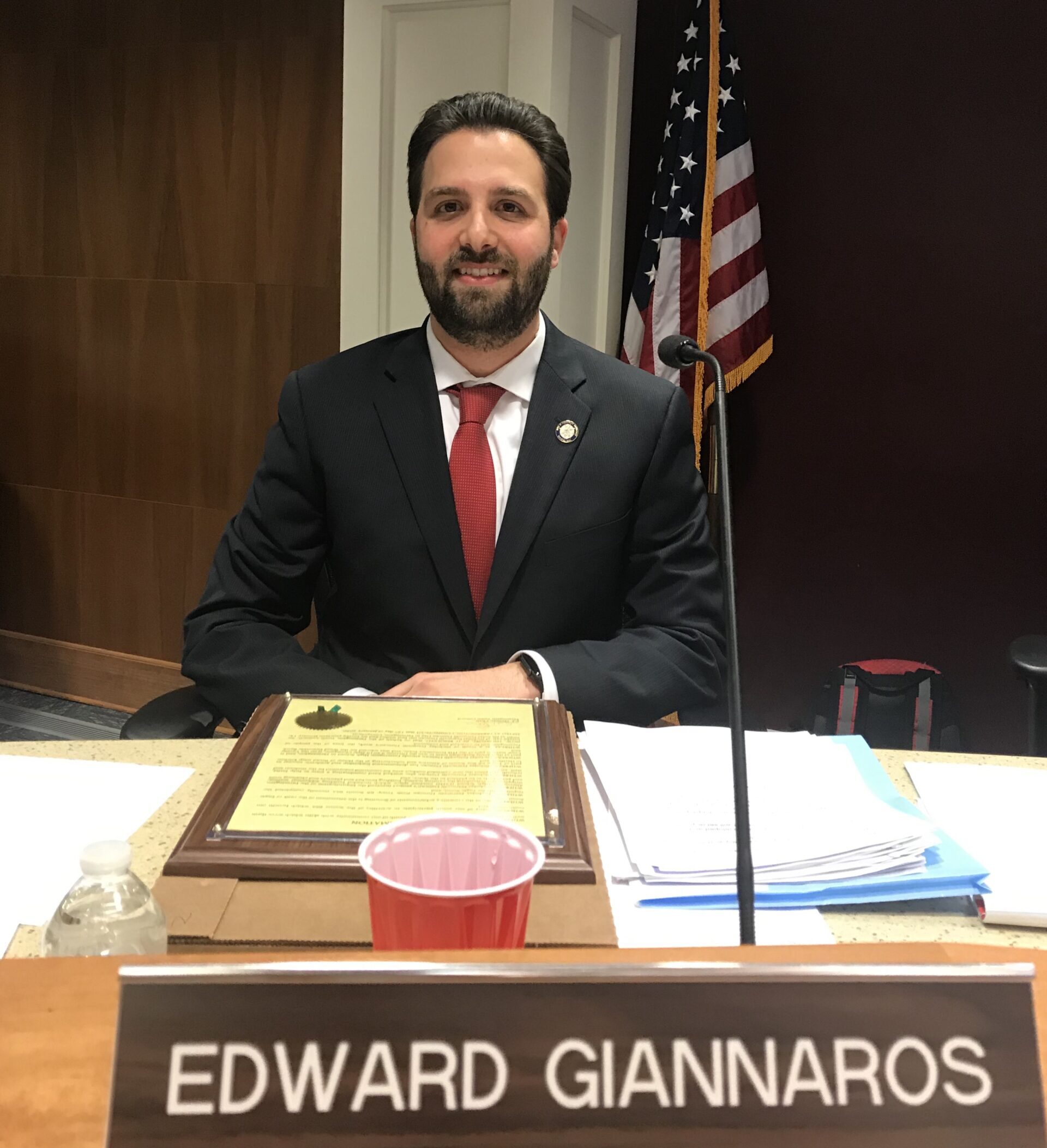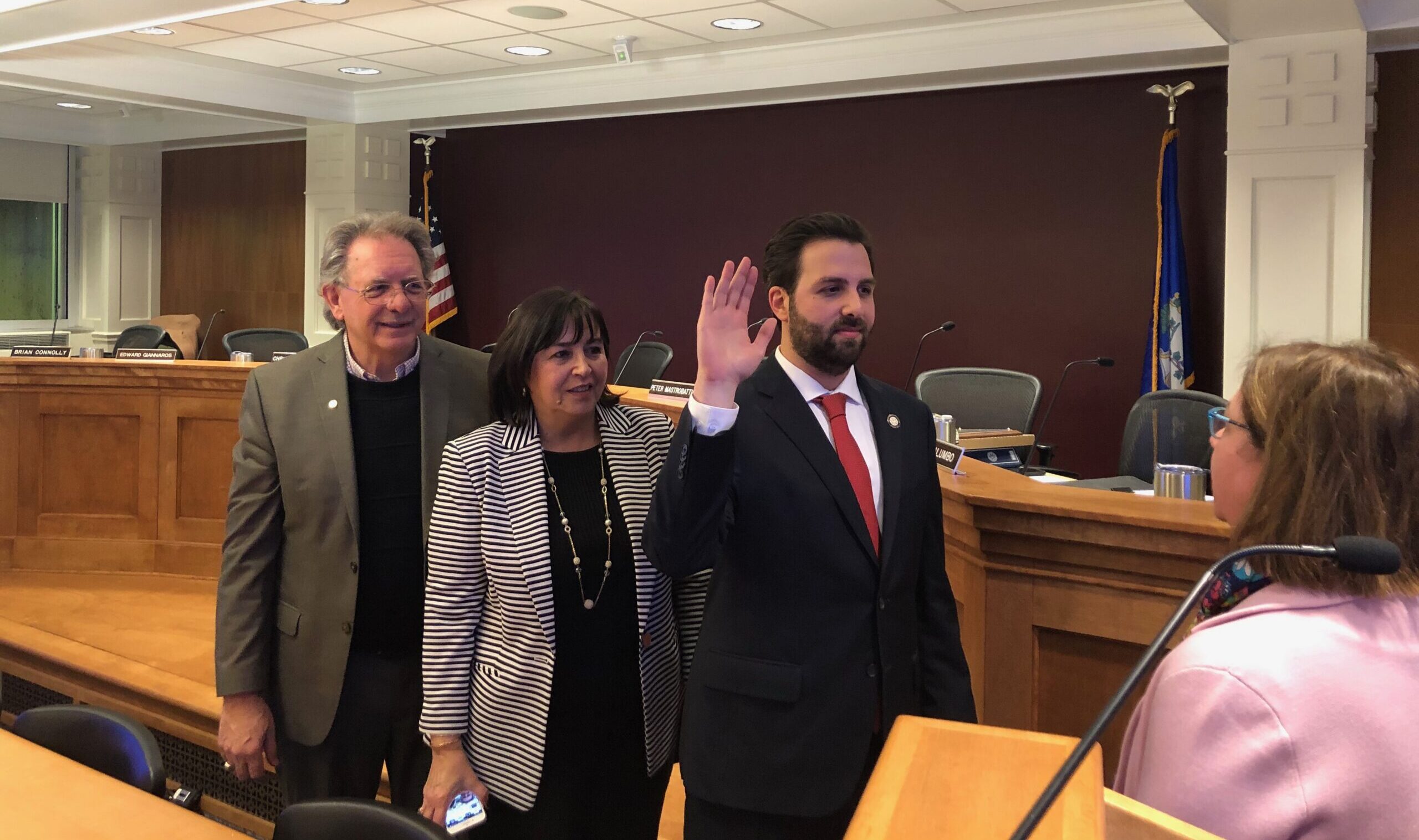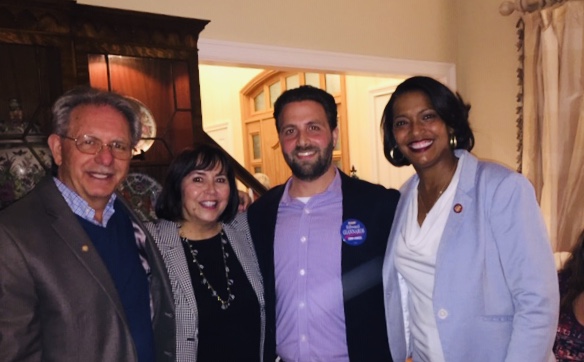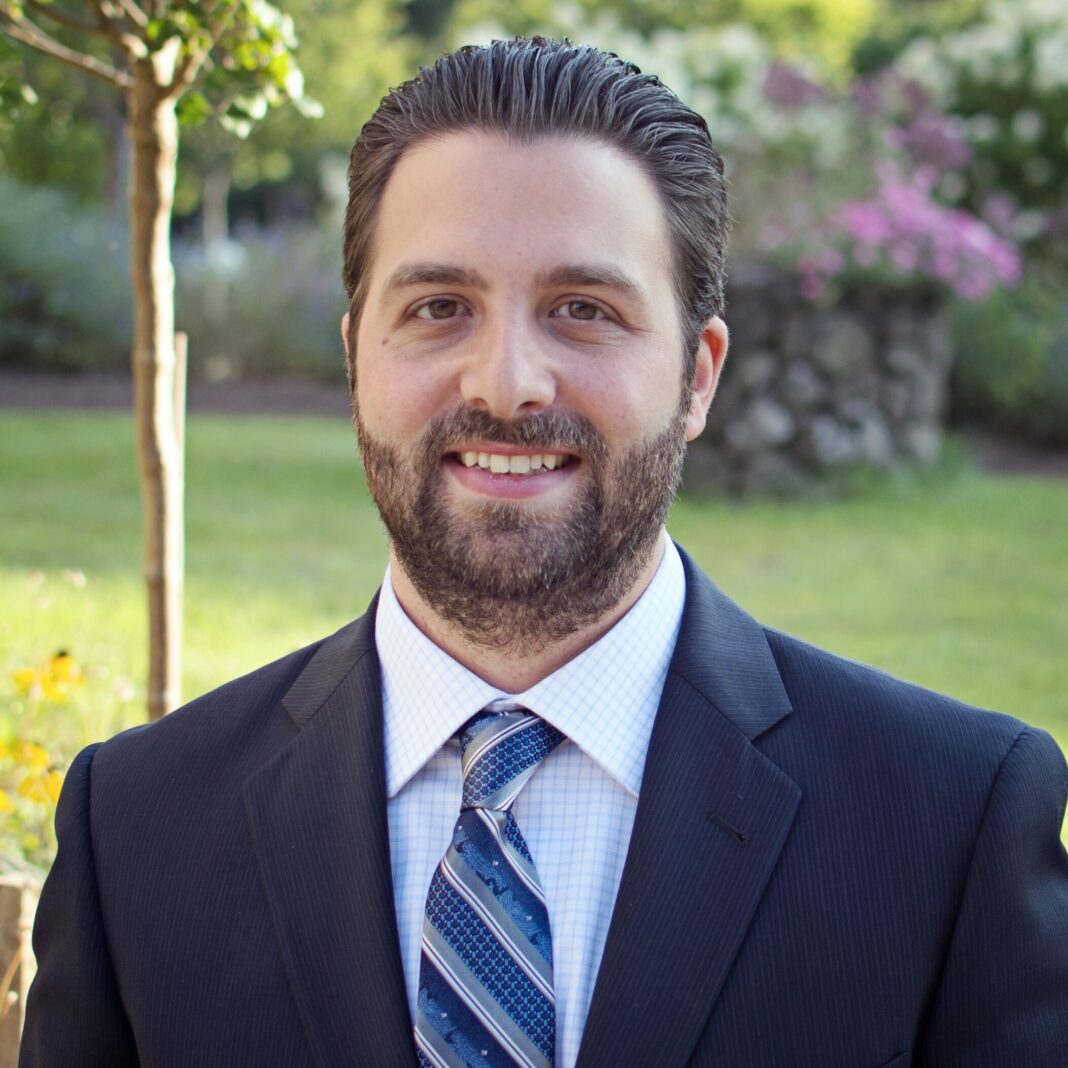Greek-American Edward Giannaros was recently re-elected to serve on the Town Council for the town of Farmington, CT. Born and raised in Farmington, Edward attended The George Washington University in Washington, DC, and graduated with a bachelor’s degree in International Business. He then went on to complete his MBA in Finance at the Barney School of Business at the University of Hartford. Since then, he has been employed by The Travelers as a Senior Financial Analyst and currently as Software Developer for the Finance Tech Team.
The Giannaros family has a history of political and community involvement. It is no surprise Edward has chosen to follow in their footsteps and make a difference the way he can in his community.
Edwards’s parents were both born in Greece. His mother, Liz, was born in Athens and his father Demetrios was born on the island of Samos. His mother, a graduate of Tufts University, worked as a Development Officers for Harvard University, was the Clerk for the Children’s Committee in the Connecticut Legislature, and a lecturer in political science at Central Connecticut State University and our local community college. She also served for eight years as the Chair of the Farmington Democratic Town Committee working on many national, state, and local elections. His father, Demetrios, was a Professor of Economics at the University of Hartford for 31 years and he also taught at Suffolk University and Boston University. He was the Director of the US Consortium for Management Education in Central and Eastern Europe assisting in the restructuring of Eastern European countries to market-based economies. He served in the Connecticut House of Representatives for 16 years as State Representative, Deputy Speaker of the House and Deputy Majority Leader. For seven years he was President of the World Hellenic Inter-Parliamentary Association – an organization for elected officials of Greek heritage from around the world.
The publisher of the Hellenic News of America, Aphrodite Kotrotsios, chatted with Edward about his recent victory, his political aspirations, and his Greek heritage.

AK: What inspired you to get involved in politics?
EG: Well, I think it’s in all Greeks’ blood one way or another. Either we’re actively involved in political life, like running for office, or we’re debating issues at home or in the cafenio. I don’t think there is a Greek who doesn’t have a strong opinion on political matters. And, that’s a good thing! This goes all the way back to ancient Athens. After all, we’re the people who gave birth to democracy and debated issues in the public square. I enjoy helping people through public service either advocating for people who need help or for issues I and my constituents feel are important.
As you can see both my parents were (and still are) very involved in politics and public service. They instilled in me and my younger brother, Jason, the importance of being involved in the public arena and giving back to our community and the country that has given us so much. Jason worked for a number of years at the US Senate, earned a Master’s in Public Policy from Georgetown University and is currently completing his Ph.D. in political science and international relations at the University of Southern California. You can say that this really is a family tradition.
AK: How long have you been involved in politics? Where did you start out?
EG: I have been in public office for 15 years. I was first elected to the Zoning Board of Appeals in Farmington and served for 12 years (serving as Chairman for 5 years); and I’ve been elected twice to the Town Council.

AK: As part of the Town Council, what initiatives do you lead and which are most important to you?
EG: With my finance background, I serve as the Council’s Liaison to the Economic Development Commission that promotes a vibrant business sector and attracts businesses from other regions and other countries. We work to support local businesses which are vital to our community and the state. Environmental issues are also important to me and my constituents. For example, protecting open space and our natural resources – all the things we can’t replace once they are gone.
AK: What are some challenges that you face and how do you overcome them?
EG: The biggest challenge we face over the short and medium term is how the economic downturn that we are currently in will affect our businesses, our workers’ employment, their income, and the impact that this will have on our tax revenue and our financing of much needed social services. The Covid-19 crisis impacts our educational system requiring innovative solutions that may have also financial implications. We need to think out of the box to make the best possible decisions now given the economic uncertainties we face.
AK: Talk to us about your political aspirations.
EG: I’m happy where I am right now serving my town on the Council but I’m open to any opportunities that may present themselves in the future.
AK: Your father was president of the World Hellenic Inter-Parliamentary Association for 7-years. What are some of Greece’s national issues that matter most to you?
EG: My father was a member of the WHIA for 16 years in total with 7 as president. I attended many meetings and it was a great education on Greek issues. The return of the Parthenon Marbles is very important to me. As is the illegal Turkish occupation of northern Cyprus that has unconscionably lasted almost half a century now; and the treatment of the Patriarchy and Hagia Sophia in Constantinople.

AK: Do you think the Parthenon Marbles should be returned? If so, what do you propose?
EG: Of course, England should return them to Greece. The Parthenon Marbles are Greece’s most proud cultural treasure and national symbol and should never have been absconded in the first place. England has disingenuously claimed to be “protecting” them but that is just an obvious excuse. With the fabulous Acropolis Museum now in Athens (which is one of the premier museums of the world), Greece can do a wonderful job of protecting and preserving them right where they belong – in Athens. We need to keep up the pressure for their return and I think there is hope given that popular opinion in England and Europe seems to be moving more strongly in that direction. Popular sentiment may be the key to London finally seeing the light.
AK: What about Greek-Turkish relations? What are your thoughts on them drilling in the Aegean?
EG: Greek and Turkish relations have been thorny since the Greek War of Independence. They are attempting to take over Greek air space and seawater rights that are based on the UN Convention on the Law of the Sea and other legal treaties. Turkey’s aggressive tactics for decades now have violated Greek air space and economic zones by illegally drilling for gas and oil. All Greeks and Philhellenes worldwide need to keep the pressure on Turkey to recognize and respect the legal rights of Greece and Cyprus.

AK: What are your thoughts on the Greek economy?
EG: The Greek economy depends substantially on income from tourism. With the worldwide economic impact caused by the Corona Virus, it has and will have a dramatic negative effect on the Greek economy. Aside from trying to attract more tourism in the short term, Greece in the long term needs to diversify their economy and become less dependent, proportionately, on tourism. One example is investing more in advanced technology given the high number of scientists and engineers educated in Greece.
AK: Where are you from in Greece?
EG: My mother’s family is originally from Pontos. They ended up having to flee Asia Minor due to the Ottoman genocide against Greeks and Armenians. They crossed the Black Sea to Sochi in Russia where they rebuilt their life only to leave it all again to escape Stalin’s brutal regime. As Greek citizens, they escaped by ship to Athens where they had to start over once again.
My father was born and raised with his four siblings on the island of Samos and his paternal grandmother is from Santorini. His family of 7 immigrated to Boston, Massachusetts in 1964. With little money in their pockets and within weeks of arrival, my grandparents started a small business with a loan from a local bank. Like many Greek immigrants, they worked very hard and built a successful business.
AK: Do you go back often? If so, where do you like to go?
EG: Yes, I try to go back every summer that I can. As I tell all my friends, there is nothing better than summer in Greece. I’ve had the pleasure of traveling to many parts of Greece and every area has its own beauty and charm. But I have to say that I feel very close and at home in Samos. I’ve been going there since I was very little. My father was born in Karlovasi but his grandparents lived in a small village called Leka. I remember my father’s uncle taking my brother and me out on his donkey and showing us which olive trees were his and where he had grapevines. Maybe because we’re from Samos, I particularly love the Greek islands. I’ve been to Santorini multiple times, Naxos, Skiathos, Aegina, Spetses, Crete, Rhodes, Lesbos and I’m probably leaving some out.

AK: How has your Hellenic heritage guided you to get to where you are today?
EG: I think my Hellenic heritage gave me a wealth of knowledge and pride in all that our ancestors have given the world. Greeks have made so many contributions in all fields like politics, science, medicine, arts, theater, philosophy, and too many more to name. And the emphasis on what is “axios” regardless of which field you are in, is inspiring. I’m proud to know that we stand on such a rich foundation that always strived for excellence. That gives me the inspiration to do the same.
AK: How are you involved with your Greek-American community?
EG: One of the most important things we can do for our community is to educate and inform non-Greeks on our issues. I try to educate people on the Greek perspective for issues like the return of the Parthenon Marbles or what is happening with Turkey. The more others understand the history behind the issues, the more they can understand and support our perspective. We can affect change better if others, not just Greeks, really know and care about the issues.
AK: What advice do you have for young aspiring professionals?
EG: Don’t expect instant success. There are no shortcuts to excellence. To reach your goals, whatever they may be, you need to put in hard work. Look to people in your field that you admire and observe how they approach challenges and learn from them. Having a mentor can be one of the most valuable resources you can have as you build your career.
AK: What is your life’s motto?
EG: I don’t know that I have one life motto but I do like Aristotle’s observation that Excellence is not an act, it is a habit. No matter how small the task, do everything the best way you can. You may not think so, but people will notice. Strive to be the best person you can be in both your personal and professional life. In the end, your reputation is your most valuable asset.







